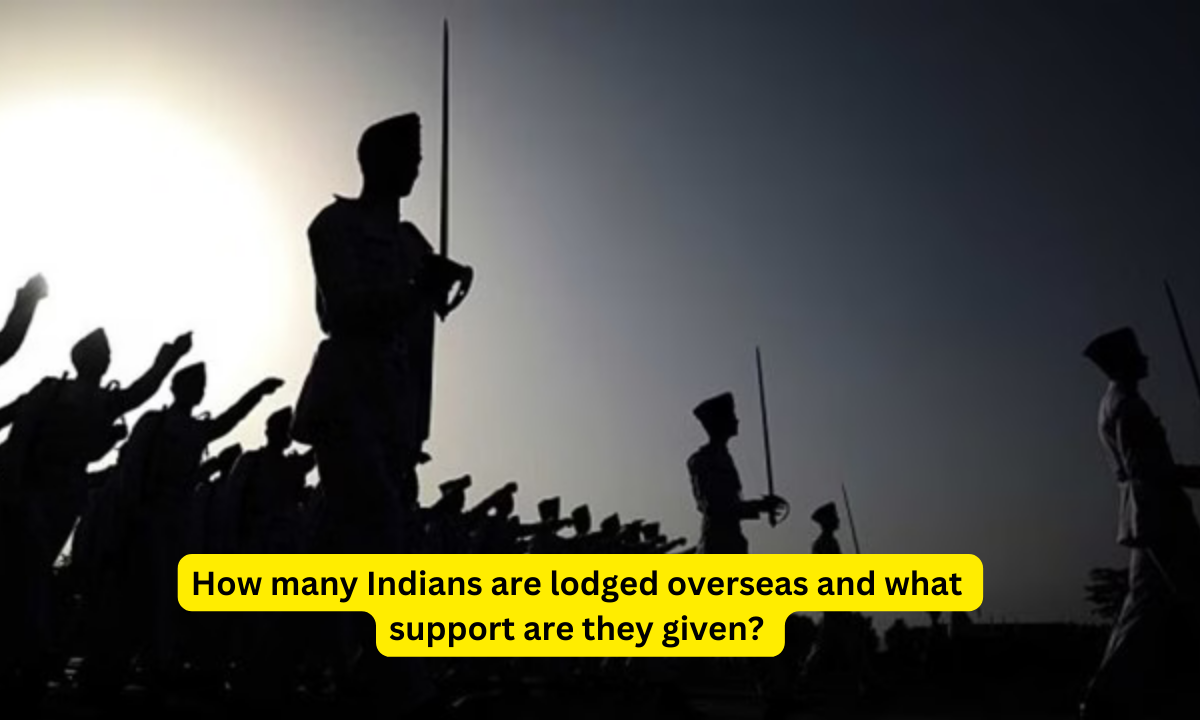Table of Contents
Eight former Indian Navy personnel who were detained in connection with an alleged case of espionage had their death sentences commuted by a Qatari appellate court. The Ministry of External Affairs issued an official statement stating that it had taken note of the Court of Appeal’s decision, but the specific ruling is still pending.
India has the largest citizen diaspora globally, with over 9,500 Indians incarcerated overseas. Of these, three out of every five are incarcerated in the Middle East, with Qatar housing the third-highest number of offenders in the area.
How many Indians are living overseas?
Over 1.3 crore (1,36,01,780) non-resident Indians (NRIs), over 1.8 crore (1,86,83,645) persons of Indian origin (PIOs), and as many as 3.2 crore (3,22,85,425) overseas Indians reside in 210 countries,based on information made available by the Ministry of External Affairs (MEA).
How many Indians are residing abroad?
On December 8, Minister of State for External Affairs V Muraleedharan responded to a question from Gulbarga BJP Lok Sabha MP Umesh G Jadhav, stating that there were currently 9,521 Indian detainees, including undertrials, in foreign prisons.
The amount, he continued, might be greater because many nations with strict privacy rules do not exchange information about their inmates.
Where do most Indian Navy inmates reside?
Ninety-five percent of the 210 countries where the Indian diaspora is concentrated have jails. Of these, 89 have jails, and more than six percent, or nearly 6,000, are in the Middle East and Asia. Saudi Arabia has the highest percentage of Indian prisoners (2,200), followed by the United Arab Emirates (2,143). Qatar has 752 Indian prisoners, Kuwait 410, Bahrain 310, and Oman 135.
The majority of Indian prisoners in Europe are housed in the United Kingdom (278), followed by 165 in Italy, 77 in Germany, 40 in France, and 30 in Spain. Of the 1,227 total prisoners, slightly over 23% are in Nepal, 309 in Malaysia, 308 in Pakistan, 180 in China, 86 in Singapore, 59 in Bhutan, and 47 in Bangladesh.
What occurs when an Indian national gets detained abroad?
According to the MEA’s Standard Operating Procedure, Indian Missions and Posts abroad keep a close eye on instances of Indian nationals being imprisoned for purported legal violations. As soon as the Mission or Post learns of an Indian national’s detention or arrest, it notifies the local Foreign Office and other local authorities to obtain consular access to such individuals.
After that, MEA officials gather information about the case, verify the individuals’ Indian nationality, and take various steps to guarantee their welfare. These include contacting local law enforcement agencies to expedite the completion of court proceedings, offering all possible consular assistance, and helping to provide legal aid when necessary.
Is there legal aid available?
The Indian Community Welfare Fund (ICWF) is established at Missions and Posts abroad to assist overseas Indian nationals in distress situations in deserving cases; the support extended under ICWF includes financial assistance for legal aid as well as travel documents and air tickets during repatriation. 86 convicts were moved under the TSP between January 2022 and January 2026, as reported by the EAM. Of these, 11 foreign prisoners were sent to their home countries, and 75 imprisoned Indians were transferred to India.
What other actions do they take?
Responding to a query in July of this year, External Affairs Minister S. Jaishankar testified in the Lok Sabha that the government also pursues the subject of the release and repatriation of Indian nationals in foreign prisons during consular and other engagements with countries.
How many requests for pardons or reductions in prison terms have been granted thus far?
Using data from information shared by Indian missions and posts abroad, Jaishankar stated that since 2014, 4,597 Indian nationals have had their sentences pardoned or reduced by foreign governments as a result of efforts by the Indian government through various channels. He also mentioned that some countries occasionally pardon or reduce the sentences of inmates of different nationalities without disclosing the information to other countries.
Is there a system in place to swap prisoners?
The Republic of India has executed Agreement(s) on Transfer of Sentenced Persons (TSP) with thirty-one nations, including Australia, Bahrain, Bangladesh, Bosnia & Herzegovina, Brazil, Bulgaria, Cambodia, Egypt, Estonia, France, Hong Kong, Iran, Israel, Italy, Kazakhstan, Korea, Kuwait, Maldives, Mauritius, Mongolia, Qatar, Russia, Saudi Arabia, Somalia, Spain, Sri Lanka, Thailand, Turkey, the United Arab Emirates (UAE), the United Kingdom, and Vietnam.
The Inter-American Convention on Serving Criminal Sentences Abroad and the Council of Europe Convention on Transfer of Sentenced Persons are two multilateral conventions on the transfer of sentenced individuals that India has signed. Under these conventions, sentenced individuals from member states and other nations that have acceded to them may request the transfer of prisoners.
How successful have these agreements proven to be?
86 convicts were moved under the TSP between January 2022 and January 2026, as reported by the EAM. Of these, 11 foreign prisoners were sent to their home countries, and 75 imprisoned Indians were transferred to India.
